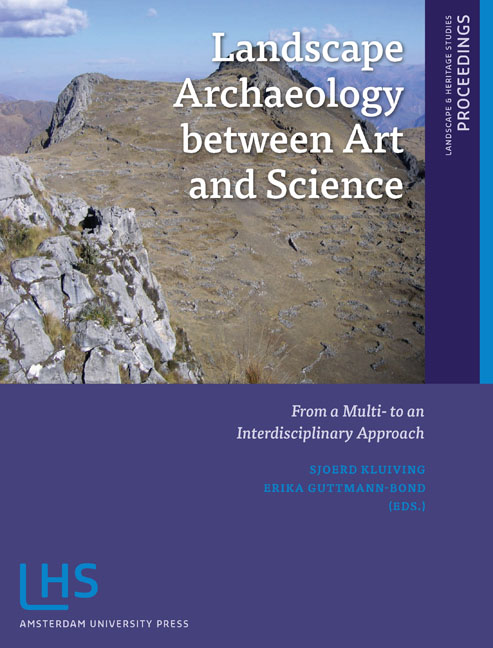Book contents
- Frontmatter
- Contents
- Preface
- Introduction: LAC2010: First International Landscape Archaeology Conference
- THEME 1 HOW DID LANDSCAPE CHANGE?
- THEME II IMPROVING TEMPORAL, CHRONOLOGICAL AND TRANSFORMATIONAL FRAMEWORKS
- THEME III LINKING LANDSCAPES OF LOWLANDS TO MOUNTAINOUS AREAS
- THEME IV APPLYING CONCEPTS OF SCALE
- THEME V NEW DIRECTIONS IN DIGITAL PROSPECTION AND MODELLING TECHNIQUES
- THEME VI HOW WILL LANDSCAPE ARCHAEOLOGY DEVELOP IN THE FUTURE?
- Miscellaneous Endmatter
6.3 - The past Informs the Future; Landscape Archaeology and Historic Landscape Characterisation in the UK
Published online by Cambridge University Press: 21 January 2021
- Frontmatter
- Contents
- Preface
- Introduction: LAC2010: First International Landscape Archaeology Conference
- THEME 1 HOW DID LANDSCAPE CHANGE?
- THEME II IMPROVING TEMPORAL, CHRONOLOGICAL AND TRANSFORMATIONAL FRAMEWORKS
- THEME III LINKING LANDSCAPES OF LOWLANDS TO MOUNTAINOUS AREAS
- THEME IV APPLYING CONCEPTS OF SCALE
- THEME V NEW DIRECTIONS IN DIGITAL PROSPECTION AND MODELLING TECHNIQUES
- THEME VI HOW WILL LANDSCAPE ARCHAEOLOGY DEVELOP IN THE FUTURE?
- Miscellaneous Endmatter
Summary
ABSTRACT
In helping society both understand its past and design a sustainable future, the landscape archaeologist's role is widely inclusive. If all society matters, then all landscape matters and all stories have relevance. All disciplines and all actors are drawn in.
Focusing on how landscape archaeology is practised in the UK, this paper explores how we currently tease out and present those myriad stories and how we might adjust our methods to extend our range. Inquisitive, theoretical, empirical and phenomenological approaches all contribute much while their methods are rigorous and transparent and their outputs are clear.
In addition, characterisation generalises from and so extends the benefit of more particular landscape archaeology while creating a scheme of provisional interpretation that serves as a framework for further research. Historic landscape characterisation developed alongside the drafting of the European Landscape Convention and shares many of its principles and aims. It encourages inquisitiveness, debate and argument over stories and their interpretations, and over strategies and plans.
KEYWORDS
characterisation, future, inquisitiveness, inclusivity, framework, action
Ceaselessly the river flows, and yet the water is never the same, while in the still pools the shifting foam gathers and is gone, never staying for a moment… (Chōmei 1212, 1)
THE RESPONSIBILITIES OF THE LANDSCAPE ARCHAEOLOGIST
If archaeology involves study of people (present and past) through their material and if landscape is perception of an area that has been affected by both natural and human actions (Council of Europe 2000), then landscape archaeology should necessarily be widely inclusive in terms of subject, method and discipline. Archaeologists help society, communities, and individuals appreciate that landscape is more than environment: that it is doubly cultural – a cultural product culturally perceived. They also continually confirm that landscape is fundamentally a product of change, and so help prepare society and its members to cope with and take control of further change.
Inheritance, continuity and legibility of earlier forms and features, as in the 13th century poet Chōmei's ceaselessly flowing but constant river, are widely valued landscape qualities.
- Type
- Chapter
- Information
- Landscape Archaeology between Art and ScienceFrom a Multi- to an Interdisciplinary Approach, pp. 485 - 502Publisher: Amsterdam University PressPrint publication year: 2012



